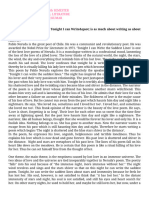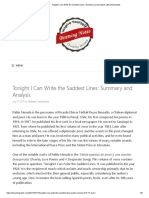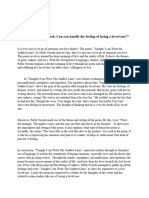To Night I Can Write
To Night I Can Write
Uploaded by
ডাক বাহীCopyright:
Available Formats
To Night I Can Write
To Night I Can Write
Uploaded by
ডাক বাহীOriginal Description:
Original Title
Copyright
Available Formats
Share this document
Did you find this document useful?
Is this content inappropriate?
Copyright:
Available Formats
To Night I Can Write
To Night I Can Write
Uploaded by
ডাক বাহীCopyright:
Available Formats
To Night I Can Write: Theme/Critical Appreciation
Throughout ‘Tonight I Can Write’ Neruda engages with themes of love, love lost, and solitude. He expresses
his loneliness through poetic language and poignant images. Neruda’s speaker also discusses change, the
transformation of his relationship with “her” and how he feels now. It seems to him that she will “be someone
else’s” and that he has lost her. But, readers should not, it is only because of this sad state of mind that he’s
able to write this poem. He remembers “nights like this” when he held her and now he’s “lost without her”.
The lady whom he has loved is going to be another’s and the poet thinks that he can voice his loss in the most
poignant terms. He can express it in the conventional way, that the night is shattered and the blue stars shiver
in the distance. The wind revolves in the sky and sings. He remembers that he loved his lady. Perhaps she also
loved him, but he is not sure. He held her with his arms, through night like the present one and kissed her
under the endless sky. She certainly loved him, maybe he also loved her, for no one could have missed her
great still eyes. Perhaps he can write the saddest lines when he thinks that he does not have her and feels that
he has lost her forever, and the night is more fierce without her. His verse may fall to the soul like dew drops
to the green pasture.
It is no use thinking that his love could not keep her. The night is shattered and she is no longer with him.
Someone is singing in the distance, and his soul is not at all happy that it has lost her. His sight searches for
her, and his heart looks for her. The same moonlit nights whiten the same trees. But they are no longer the
same.
It is certain that he no longer loves her, but he loved her once very much. His voice could not reach her. She is
going to be another’s, her voice, bright body and infinite eyes – all will be another’s. It is true that he no longer
loves her, but he may love her. His love was so short but forgetting may take longer time. This may be the last
pain she makes him suffer, and this the last verse he writes for her.
Though there is much in the poem that is in line with the conventional romantic lyrics, Neruda’s love poem
strikes a new note in that it is not addressed to the loved one and that it probes the complexity of love. The
poem also challenges the convention of traditional love poetry and the very conception of romantic love.
Mutability is presented as a reality in love relationship and it is suggested that the grief caused will soon be
forgotten and will lead to a revival of love.
The poems that brought Pablo Neruda into the limelight are essentially love poems where he makes use of
vivid nature imagery and symbolism to express himself. In the poem, Tonight I Can Write, the poet is
extensively lyrical and the very verbs he uses in the lines like “The night is shattered/and the blue stars shiver
in the distance”, they emphasize the pent-up passion that inspires his poetry. The significance of the love affair
lies in the fact that he has lost her, for he admits that while: She loved me/sometimes I loved her too.
You might also like
- Tonight I Can Write The Saddest Lines (With Quiz)100% (2)Tonight I Can Write The Saddest Lines (With Quiz)25 pages
- What Are The Pros and Cons of Making Friends VirtuallyNo ratings yetWhat Are The Pros and Cons of Making Friends Virtually2 pages
- Tonight I Can Write The Saddest Lines ANALYSISNo ratings yetTonight I Can Write The Saddest Lines ANALYSIS1 page
- Mahananda Tonight I Write The Saddest LinesNo ratings yetMahananda Tonight I Write The Saddest Lines32 pages
- Write A Critical Appreciation of The Poem Tonight I Can Write0% (1)Write A Critical Appreciation of The Poem Tonight I Can Write2 pages
- Tonight I Can Write The Saddest Lines - Summary and Analysis - Beaming NotesNo ratings yetTonight I Can Write The Saddest Lines - Summary and Analysis - Beaming Notes6 pages
- Veinte Poemas de Amor y Una Canción Desesperada: ' (Twenty Love Poems and ANo ratings yetVeinte Poemas de Amor y Una Canción Desesperada: ' (Twenty Love Poems and A7 pages
- Tonight I Can Write the Saddest Lines Poem Summary and Analysis | LitChartsNo ratings yetTonight I Can Write the Saddest Lines Poem Summary and Analysis | LitCharts29 pages
- Tonight I Can Write Line by Line Analysis Symbols Themes and Style PDFNo ratings yetTonight I Can Write Line by Line Analysis Symbols Themes and Style PDF3 pages
- Literary Critique About The Poem of If You Forget Me by Pablo NerudaNo ratings yetLiterary Critique About The Poem of If You Forget Me by Pablo Neruda3 pages
- RILLORAZA - FINAL OUTPUT Literary AnalysisNo ratings yetRILLORAZA - FINAL OUTPUT Literary Analysis3 pages
- Tonight I Can Write The Saddest Lines by Pablo NerudaNo ratings yetTonight I Can Write The Saddest Lines by Pablo Neruda1 page
- LOVE Story in 140 Characters For 30 Minutes.No ratings yetLOVE Story in 140 Characters For 30 Minutes.4 pages
- Tonight I Can Write the Saddest Line (Handout)-WPS Office_090344No ratings yetTonight I Can Write the Saddest Line (Handout)-WPS Office_0903443 pages
- Tonight I Can Write-Paraphrase Summary and Analysis100% (2)Tonight I Can Write-Paraphrase Summary and Analysis13 pages
- Tonight I Can Write As A Love Poem PersoNo ratings yetTonight I Can Write As A Love Poem Perso2 pages
- Analysis On Tonight I Can Write The Saddest LinesNo ratings yetAnalysis On Tonight I Can Write The Saddest Lines1 page
- Tonight I Can Write The Saddest Lines - Reaction Paper100% (1)Tonight I Can Write The Saddest Lines - Reaction Paper2 pages
- Practical Programs With Solution: Computer ScienceNo ratings yetPractical Programs With Solution: Computer Science22 pages
- Chapter 2. Economic Analysis of Water ResourcesNo ratings yetChapter 2. Economic Analysis of Water Resources74 pages
- UT Dallas Syllabus For Socs3405.002.09f Taught by Heja Kim (Heja)No ratings yetUT Dallas Syllabus For Socs3405.002.09f Taught by Heja Kim (Heja)5 pages
- Indian Constitution Gurbani To The Indian Society.: Regional BasedNo ratings yetIndian Constitution Gurbani To The Indian Society.: Regional Based4 pages
- Since For Yet Already Just Ever Never Still Recently Lately Signal Words in Present Perfect With Grammar Key BWNo ratings yetSince For Yet Already Just Ever Never Still Recently Lately Signal Words in Present Perfect With Grammar Key BW3 pages
- Nazim Hikmet Selected Poems by PoemHunterNo ratings yetNazim Hikmet Selected Poems by PoemHunter21 pages
- 1 POSITION PAPER Abolition of Sangguniang Kabataan POSITION PAPERNo ratings yet1 POSITION PAPER Abolition of Sangguniang Kabataan POSITION PAPER4 pages
- N (N 1) (N 2) N (N 1) (N 2) (N 3) : Chapter 12: The Binomial Theorem and Mathematical InductionNo ratings yetN (N 1) (N 2) N (N 1) (N 2) (N 3) : Chapter 12: The Binomial Theorem and Mathematical Induction2 pages
- A Study On Effectiveness of Brand Strategy of Britannia Biscuits100% (3)A Study On Effectiveness of Brand Strategy of Britannia Biscuits51 pages
- Petitioner vs. vs. Respondents Brotamonte Law Office Isabel E. FlorinNo ratings yetPetitioner vs. vs. Respondents Brotamonte Law Office Isabel E. Florin6 pages
- Case Study: Engineering Fabrication & Erection Project: Ref - No: BCL/MECH/SSMNo ratings yetCase Study: Engineering Fabrication & Erection Project: Ref - No: BCL/MECH/SSM7 pages
- Download ebooks file The Complete Book of Woodworking An Illustrated Guide to Tools and Techniques Declan O'Donoghue all chapters100% (4)Download ebooks file The Complete Book of Woodworking An Illustrated Guide to Tools and Techniques Declan O'Donoghue all chapters35 pages
- A Thread From @tequieremos - "Some Parts of Imran Khan's Speech Where He Discussed The Initial Years of Pakistan's War Against Terror (... ) "No ratings yetA Thread From @tequieremos - "Some Parts of Imran Khan's Speech Where He Discussed The Initial Years of Pakistan's War Against Terror (... ) "6 pages

























































































